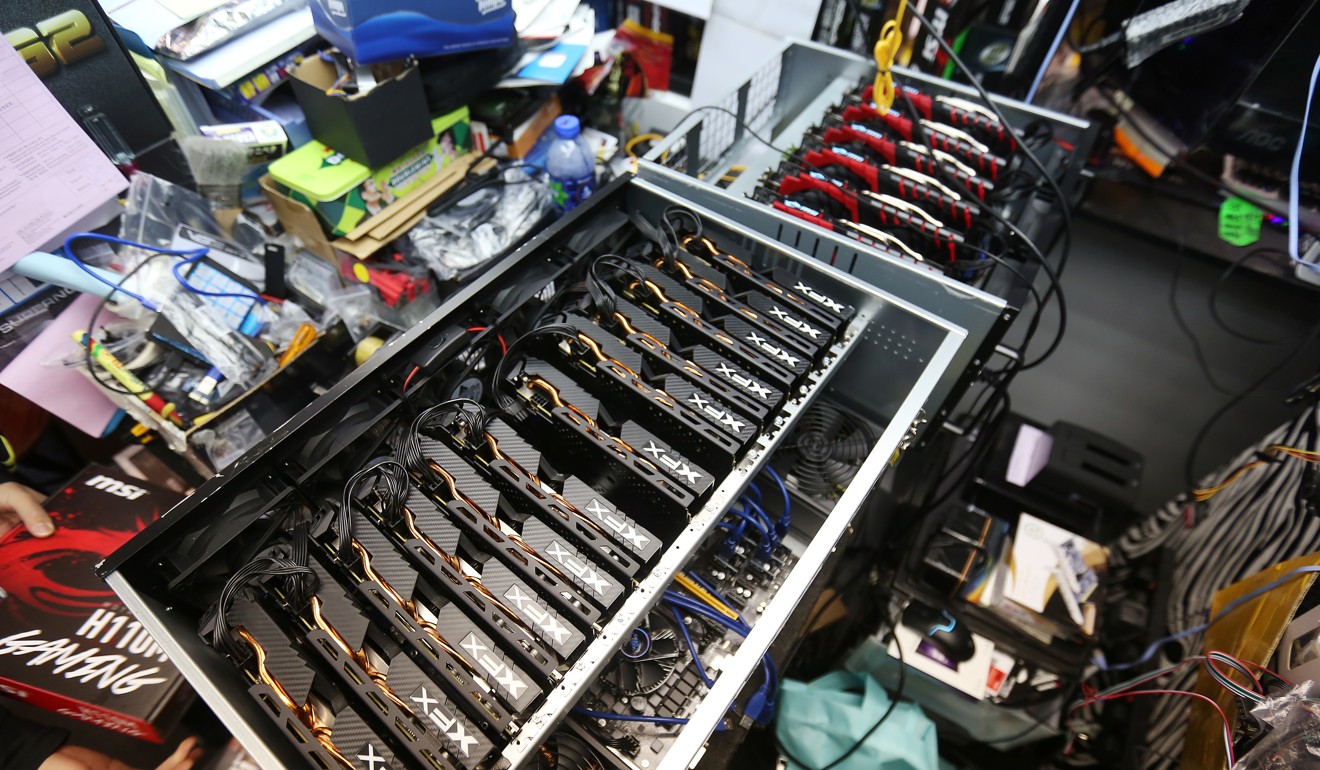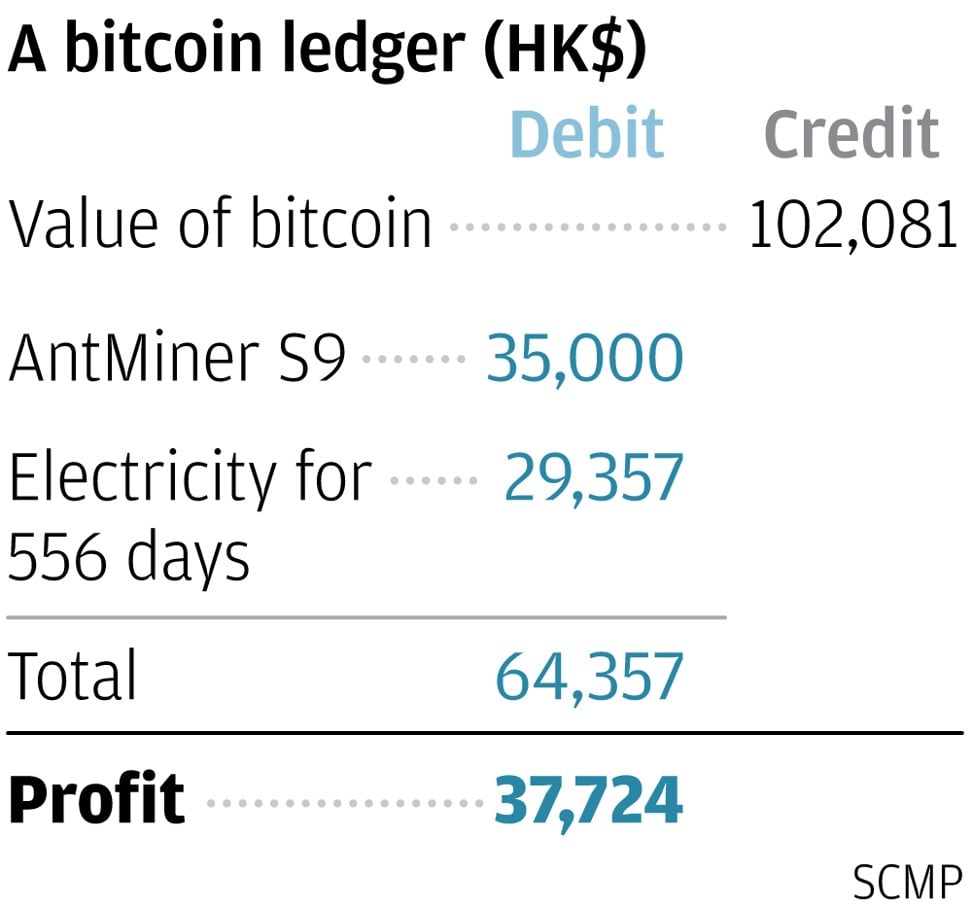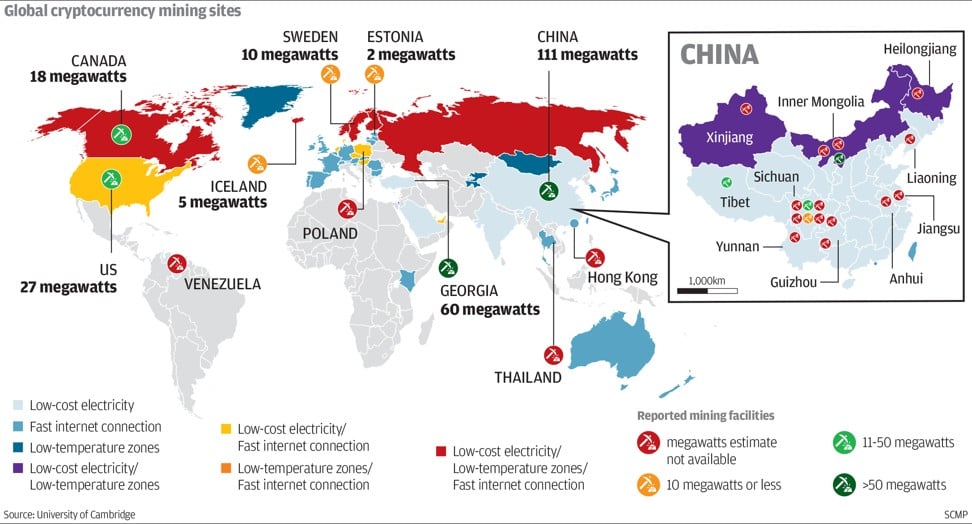
It takes 556 days of computing and a hefty electricity bill to mine a single bitcoin. Is it worth it?
The prices of crypto mining computers have risen with soaring bitcoin prices, prompting some enthusiasts to mine for Ethereum and other alternatives
At the Golden Arcade at Sham Shui Po, a new product is creating a stir among the community of geeks, gamers and offbeat collectors that call this jam-packed shopping centre in Kowloon their haven.
A banner that reads “Mining Specialist” stands out from among all the stores selling X-Box games, comic books, action hero figurines and video game consoles.
Roy Chen sells computer hardware specially configured for the complex calculations required to mine bitcoin and other forms of cryptocurrencies, having made the switch from selling everyday laptops and personal computers a year ago.
Cryptocurrency mining “became trendy again since 2016, with many people getting back into it,” Chen said in an interview. “So we began selling bitcoin equipment as a result.”

The entry-level price of a computer capable of mining cryptocurrencies starts at HK$25,000 (US$3,195), which is up 25 per cent from just two months ago, Chen said. The price increase tracks the astonishing surge in the price of bitcoin, the most popular of more than three dozen types of cryptocurrency, from less than US$5,000 each at the end of September to US$18,674 by mid-December.
Demand for graphic processing units (GPUs), the most important components for bitcoin miners, has gone “mad”, following the surge of bitcoin prices, which took off in August after China’s central bank started cracking down on the digital currency.
Bestsellers such as Nvidia’s GeForce GTX 1070 and 1080, as well as RX480 and RX580 made by Radeon Technologies Group, formerly known as AMD Vision, are sold out and currently out of stock in Hong Kong.
It’s a “good problem to have,” Chen said, because his sales revenue from peddling bitcoin equipment has doubled compared to selling run-of-the-mill laptops or computers.
Why does it take so long and cost so much to trade bitcoin?

Nearby, the price of professional bitcoin mining machines such as Bitmain Technologies’ AntMiner S9 model have almost tripled to HK$35,000 from HK$13,000, according to Cheap Monster’s co-founder Jacky Young. Bitmain is a Beijing-based semiconductor manufacturer and designer of ASIC chips used for bitcoin mining and artificial intelligence, founded in 2013.
“Even if you are willing to pay, it is still very difficult to find a machine that’s available,” he said. “If you place an order at the original price, there’s no promise you’ll get one, even months later.”
In Beijing, the AntMiner S9 costs a little more, at 31,600 yuan (US$4,900), according to the BTCfans.com website. The computer can mine 0.0018 bitcoin in a day, roughly equivalent to HK$173 at current bitcoin prices. To mine a single bitcoin would require running the computer round-the-clock for 556 days.
What would that entail in electricity bills? An AntMiner S9 consumes 33 kilowatt-hours of electricity every day, so running it for a month continuously would require 1,000 kWh of power. A computer like this working from home would incur about HK$1,600 in monthly electricity bill.
The cost is even cheaper in outlying cities. That is why the mainland is home to the world’s biggest cryptocurrency mines, with the equivalent of a combined 111 megawatts of computational power being put to work, according to the University of Cambridge.
While a back-of-the-napkin calculation suggests that the initial cost of buying a cryptocurrency mining computer can be recovered in about 200 days if a coin is successfully mined, the reality is far from the maths. That is because the computational difficulty in bitcoin mining increases by about 7 per cent every 13 days on average.
So it now takes about 900 days of round-the-clock computing in rural China to recover the cost of owning a single AntMiner S9, according to BTCfans.com.
Infographics: What’s in your wallet? An illustrated guide to bitcoin
It’s not worth it if you are an ordinary person. If you are a computer geek, then you will be spending HK$25,000 on a computer anyway
One strategy may be to not put the trust in a single cryptocurrency, said Harry Wong Hon Kit, who spent HK$25,000 on a computer to mine Ethereum, another emerging cryptocurrency. Wong said he has earned a “few thousand dollars” in the last month from his mining.
“It’s not much, but I’ll stick with it, and am looking at alternatives,” he said.
Rather than investing in all-in-one mining machines like the AntMiner S9, Joseph Wang assembled his own computers that can mine Ethereum, whose value has soared 13,000 per cent in a year, since its 2015 release.
Wang, a cryptocurrency investor and adviser in Hong Kong, spent HK$9,000 on three RX580 graphic processors and HK$8,000 on other components. If the price of Ethereum rises by 10 times, mining it gets a return of about US$20 a day, Wang estimated.
“It’s not worth it if you are an ordinary person,” he said. “If you are a computer geek, then you will be spending HK$25,000 on a computer anyway.”




